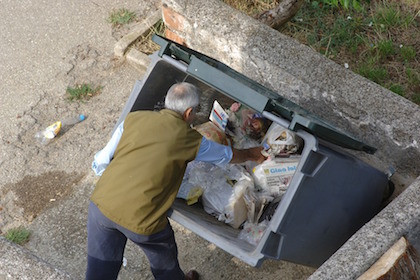
Should Food Sharing Be Illegal?
More Than 70 US Cities Have Attempted to Ban Food Sharing
According to the National Coalition for the Homeless, citywide restrictions on food sharing are growing in the U.S. More than 70 cities have passed or attempted to pass laws that make feeding the homeless a criminal offense.
July 26, 2016 | Source: Mercola.com | by Dr. Joseph Mercola
In 2014, 90-year-old World War II veteran Arnold Abbott was arrested in Fort Lauderdale, Florida, for feeding the homeless. The city had recently passed a controversial ordinance that restricts where charitable groups can feed the homeless on public property.
The ordinance was described as a way to control the area’s growing homeless population. Abbott, however, had no plans of stopping his altruistic acts. After being arrested on November 2, 2014 — along with two pastors — police cited him again on November 6, 2014.
Mayor Jack Seiler defended the arrest and told Abbott to secure an indoor location instead. In response, Abbott said no indoor venues to feed the homeless were available, and he intended to continue with his mission outside until the mayor found him a suitable location indoors.1
Meanwhile, by last year at least five lawsuits had been filed against Fort Lauderdale, alleging that the law is unconstitutional.2 The case of Abbott versus Fort Lauderdale may seem like an extreme example, but it is, unfortunately, not unique.
More Than 70 US Cities Have Attempted to Ban Food Sharing
According to the National Coalition for the Homeless, citywide restrictions on food sharing are growing in the U.S. More than 70 cities have passed or attempted to pass laws that make feeding the homeless a criminal offense.3
The legislation works in a number of ways. For instance, some cities require permits be obtained (for a fee) before food may be distributed on public property.
Other legislation restricts food sharing on the grounds of food safety, requiring organizations sharing food to comply with overly strict food-safety regulations, such as only preparing food in approved locations or serving only pre-packaged meals. Mother Jones reported in 2014:
“When the issue of food safety was raised during a court hearing on Myrtle Beach, South Carolina’s food-sharing law, the legal director of the state’s ACLU [American Civil Liberties Union] chapter pointed out that similar restrictions weren’t being levied against family reunions in parks, for instance, and that it had never received a single report of homeless people getting sick from the food.
A Utah state representative said the same thing about Salt Lake City’s food-sharing law.”
Food-Sharing Bans Attempt to Move the Problem of Homelessness Elsewhere
In some cases, community members may force the food-sharing organization to relocate or stop operating in order to make the location “less attractive” for homeless people. According to a National Coalition for the Homeless report:4
“The final, and most difficult to measure, method to restrict food-sharing with people experiencing homelessness is through community actions driven by the principle of ‘Not In My Back Yard (NIMBY).’
In most cases, business- and home-owners [sic] who do not want people experiencing homelessness to be attracted to their communities, place tremendous pressure, and sometimes even harass, the organization responsible for the food-sharing program to cease or relocate their programs.”
The National Coalition for the Homeless believes, however, that simply stopping food sharing will not make homeless people disappear — nor will sharing food encourage people to be homeless.
Instead, they cite lack of affordable housing and job opportunities, mental health problems, addiction and physical disabilities as top reasons that perpetuate homelessness.
Is it Illegal to Buy a Meal From Your Neighbor?
The issue of food sharing stretches far beyond feeding the homeless. What if, for instance, you were ill, too busy or simply did not want to cook meals for yourself and your family?
